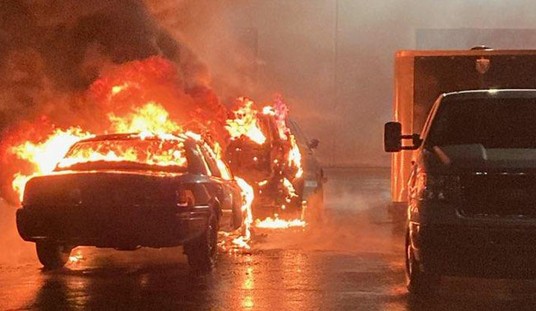Has the White House decided to retaliate against the Bashar al-Assad regime after an alleged chemical attack on a Damascus neighborhood left hundreds dead? The US reiterated today that no one has established with certainty what happened — but an American naval group has started toward Syria (via Instapundit):
U.S. naval forces are moving closer to Syria as President Barack Obama considers military options for responding to the alleged use of chemical weapons by the Assad government. The president emphasized that a quick intervention in the Syrian civil war was problematic, given the international considerations that should precede a military strike.
The White House said the president would meet Saturday with his national security team to consider possible next steps by the United States. Officials say once the facts are clear, Obama will make a decision about how to proceed.
Defense Secretary Chuck Hagel declined to discuss any specific force movements while saying that Obama had asked the Pentagon to prepare military options for Syria. U.S. defense officials told The Associated Press that the Navy had sent a fourth warship armed with ballistic missiles into the eastern Mediterranean Sea but without immediate orders for any missile launch into Syria.
It’s becoming clearer that some kind of chemical weapons were used in the attack:
hree hospitals in Syria’s Damascus governorate that are supported by the international medical humanitarian organization Doctors Without Borders Médecins Sans Frontières (MSF) have reported to MSF that they received approximately 3,600 patients displaying neurotoxic symptoms in less than three hours on the morning of Wednesday, August 21, 2013. Of those patients, 355 reportedly died.
Since 2012, MSF has built a strong and reliable collaboration with medical networks, hospitals and medical points in the Damascus governorate, and has been providing them with drugs, medical equipment and technical support. Due to significant security risks, MSF staff members have not been able to access the facilities.
“Medical staff working in these facilities provided detailed information to MSF doctors regarding large numbers of patients arriving with symptoms including convulsions, excess saliva, pinpoint pupils, blurred vision and respiratory distress,” said Dr. Bart Janssens, MSF director of operations.
Patients were treated using MSF-supplied atropine, a drug used to treat neurotoxic symptoms. MSF is now trying to replenish the facilities’ empty stocks and provide additional medical supplies and guidance.
“MSF can neither scientifically confirm the cause of these symptoms nor establish who is responsible for the attack,” said Dr. Janssens. “However, the reported symptoms of the patients, in addition to the epidemiological pattern of the events—characterized by the massive influx of patients in a short period of time, the origin of the patients, and the contamination of medical and first aid workers—strongly indicate mass exposure to a neurotoxic agent. This would constitute a violation of international humanitarian law, which absolutely prohibits the use of chemical and biological weapons.”
However, that still doesn’t answer the central question of which side used the weapons. Who will US naval forces target once they arrive? Syrian state media confirms that chemical weapons were used in the attack — but says it was the rebels that used them:
Syrian state media accused rebels of using chemical arms on Saturday against government troops trying to storm a contested neighborhood of Damascus, claiming a major army offensive in recent days had forced the opposition fighters to resort to such weapons “as their last card.”
State TV broadcast images of plastic jugs, gas masks, vials of an unspecified medication, explosives and other items that it said were seized from rebel hideouts. It did not, however, show any video of soldiers reportedly affected by toxic gas in the fighting in the Jobar neighborhood of Damascus.
Still, the claims could muddy the debate about who was responsible for an alleged gas attack on rebel-held suburbs of the capital on Wednesday that activists say killed more than 130 people. That attack has spurred demands for an independent investigation and renewed talk of potential international military action if chemical weapons were indeed used.
The Assad regime still hasn’t allowed the UN inspection team into the area to check out the reports themselves. That could mean that the Assad regime is lying and trying to cover up the attack, or it might just be that the battle is still ongoing — as this report indicates. Whether or not it’s the former — and let’s face it, that’s the likely explanation — state media isn’t hesitating to pin the blame on other big players in the region, both American allies:
One message cited a Syrian TV journalist who is embedded with the troops in the district who said the army confiscated an arms cache that included gas masks and several barrels with “made in Saudi Arabia” stamped on them. It did not say what was in the barrels, but appeared to suggest that some sort of chemical agent was inside and supplied by Saudi Arabia, the region’s Sunni Muslim power and a staunch supporter of Syria’s Sunni-led revolt.
Another news scroll said that troops, after overrunning rebel positions, discovered antidotes following exposure to chemical agents. The TV said the medicines were produced by a Qatari-German medical supplies company. Qatar is another strong supporter of the Syrian rebels.
On one side, we have a hereditary dictatorship that has a track record of genocidal attacks on its own people. On the other side, we have an aggregation of impotent secularists and radical Sunni Islamists with a track record of mass-murder attack on civilians. The question isn’t which would use chemical weapons to further their cause, it’s which wouldn’t, and the answer is neither. Unless we start bombing everyone, it’s difficult to see why we’d want to intervene at all, except to grab or neutralize whatever stores of chemical weapons we can find.








Join the conversation as a VIP Member